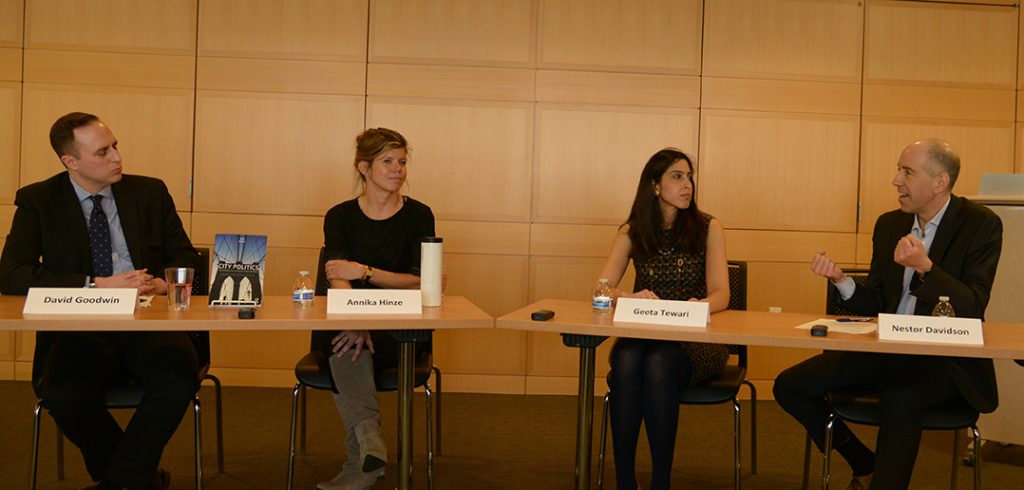With the United States federal government riven by polarization, cities have taken the lead in policy areas ranging from health to climate change. At the same time, big-city mayors are severely constrained by state governments that are often controlled by suburban and rural constituents who do not share the same priorities.
Such is the crux of the urban experience, circa 2019, according to speakers at “The Global Metropolis: Power and Policy in the 21st Century,” a panel held at Fordham’s School of Law on Feb. 6.
The discussion, part of the Maloney Library’s Behind the Book series, featured the Urban Law Center’s faculty director, Nestor Davidson, and associate director, Geeta Tewari, co-editors of Global Perspectives in Urban Law: The Legal Power of Cities (Routledge, 2018), as well as Annika Hinze, Ph.D., director of the Urban Studies program and co-author of City Politics: The Political Economy of Urban America, 10th Edition (Routledge, 2018). David J. Goodwin, GSAS’ 12, the author of Left Bank of the Hudson: Jersey City and the Artists of 111 1st Street (Fordham University Press, 2017), creator of the three-year-old series, and assistant director of Fordham’s Center on Religion and Culture, moderated the panel.
Small But Significant Victories
An issue that often brings this divide to light is immigration. One way that cities can assert their positions, said Davidson, is through the courts. Municipalities that had declared themselves sanctuaries for undocumented immigrants have gained a small degree of power through recent legal victories, he said. The court battles came as the Trump administration has tried to punish cities for refusing to cooperate with Immigration and Customs Enforcement agents by withholding unrelated funds.
“The targeting of the current administration so specifically against cities was such an indefensible overreach from a legal perspective. Whatever you think of the policy, half a dozen courts have looked at it and struck it down as unconstitutional,” said Davidson, who is also the Albert A. Walsh Chair in Real Estate, Land Use, and Property Law at the Law School.
“So that has given cities a toehold, legally, for a certain level of more political power.”
He also noted that although it’s been nearly a generation since the mayor of a major city has ascended to a level of national elected office, they have influenced major policy areas nonetheless.
“Think about what Bloomberg did here in New York when it comes to public health. The CDC (Center for Disease Control) has adopted a lot of the measures that were pioneered here with obesity and sugary drinks. We were that classic laboratory of experimentalism,” he said.
Where Partisanship is Unwelcome
That experimentalism cuts across ideological lines. Tewari, who also publishes fiction, said that when she and Davidson edited Global Perspectives, they were careful to give the eleven papers included in the book an unbiased take.
“In my fiction, my characters are partisan, and have certain political and social views [they express], whereas in our work at the urban law center and in our volumes, we strive to take into account all sides of arguments. Our goal is to get to the heart of the issue in a focused way,” she said.
The notion that urban politics in the United States is constantly evolving as a dynamic interaction between governmental power, private actors, and a politics of identity, is a key aspect of City Politics, which was originally published in 1994. For Hinze, an associate professor of political science, editing the latest edition had extra resonance. The first author, Dennis R. Judd, Ph.D., professor emeritus of political science at the University of Illinois at Chicago, was a mentor of hers in graduate school. In addition to revising data, she added sections related to the 2016 presidential election, race, and violence.
“It was certainly different because I knew there was another name on the cover that was carrying half the reputation of this book, so it was some extra pressure not to screw up. At first, it was intimidating, but then there was a lot of freedom to say ‘Well, this is something I really want to bring out,’” she said.
Tackling Big Problems Together
During the Q&A part of the discussion, one audience member wondered if, perhaps the federal government had an interest in preventing cities from defying it on big issues. Hinze said she thought it did, but noted it would be difficult to do so without undermining local democracy. And in any case, she said, cities are actually well suited to tackle big problems through groups like the Global Parliament of Mayors, a coalition of mayors from around the globe. Immigration becomes a more pressing concern for mayors, for instance, when members of immigrant communities fear they may be deported and are thus less likely to work with the police to solve crimes.
“Cities are not in a legal position to rival federal or national governments, but at the same time, they can have this really useful cross-fertilization process, where mayors get together and they talk. We’re seeing the bike share program right now that’s taking off in cities all over the world. That was a Dutch program that just took off just by being disseminated and shared by mayors.”
Davidson said a bigger cause for concern is that urban dwellers forget their suburban and rural brethren who are not benefitting from the renaissance that cities are experiencing today.
“We’re at a point in globalization where people who live in Singapore and Johannesburg and London have more in common with people who live in Manhattan than perhaps people who live in Manhattan have with people who live in upstate, rural New York,” he said.
These divides can be seen on a global scale as well. Both Brexit and the 2016 United States presidential election exposed stark ideological differences along geographical lines within one nation.
“There is a risk of exacerbating the traditional urban/rural conflict,” he said.
“When that goes global, there are some real challenges.”

